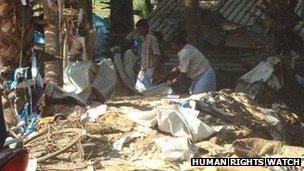Sri Lanka 'intensifies crackdown on dissent' - Amnesty
- Published

The final phase of the war, in 2009, left many thousands of people dead
Amnesty International has accused Sri Lanka of intensifying a crackdown on dissent and urged the Commonwealth not to hold its summit there unless the human rights situation improves.
It says the government is responsible for harassing and imprisoning critics.
Sri Lanka has rejected the allegations, saying that a rehabilitation process is under way after years of conflict.
Last week Commonwealth foreign ministers agreed to hold the summit in Colombo despite objections by Canada.
The next Commonwealth Heads of Government Meeting (CHOGM) is set to take place in Colombo in November and Sri Lanka would then represent the Commonwealth as its chair for the next two years.
Canada's Foreign Minister John Baird has said he was "appalled" that Sri Lanka had been chosen to host the meeting, arguing it had failed in the fundamental Commonwealth values of "freedom, democracy, human rights, the rule of law and good governance".
Dismissing Canada's objections, Sri Lanka's cabinet spokesman and information minister Keheliya Rambukwella told the BBC: "We have dealt with this human rights issue and we feel they are very biased and very unfair."
But Amnesty International's report, released on Tuesday, echoed some of the criticisms.
It says that journalists, lawyers, human rights activists and opposition politicians are among those who have been targeted in what the report calls "government-sanctioned abuse".
"Violent repression of dissent and the consolidation of political power go hand in hand in Sri Lanka," Polly Truscott, Amnesty International's deputy Asia Pacific director, said in the report.
"Over the past few years we have seen space for criticism decrease. There is a real climate of fear in Sri Lanka, with those brave enough to speak out against the government often having to suffer badly for it."
It said that human rights violations must end before Colombo is allowed to go ahead with hosting the meeting.
The Sri Lankan High Commission in London rejected the group's allegations, saying that a rehabilitation process is under way after years of conflict.
Sri Lanka's army defeated Tamil rebels after a brutal 26-year war in 2009. The entire conflict left at least 100,000 people dead.
Both sides were accused of human rights abuses throughout the conflict, with much focus on what happened in its final stages, when thousands of civilians were trapped in a thin strip of land in the north of Sri Lanka as fighting raged around them.
Estimates of civilian deaths in the final months range widely from 9,000 to 75,000.
Last month the UN's Human Rights Council passed a resolution highly critical of Sri Lanka's record.
The resolution encouraged Sri Lanka to conduct an independent and credible investigation into alleged war crimes.
- Published27 April 2013
- Published9 January 2015